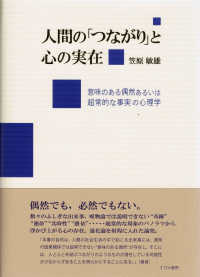Description
Panpsychism is the view that consciousness – the most puzzling and strangest phenomenon in the entire universe – is a fundamental and ubiquitous feature of the world, though in a form very remote from human consciousness. At a very basic level, the world is awake. Panpsychism seems implausible to most, and yet it has experienced a remarkable renaissance of interest over the last quarter century. The reason is the stubbornly intractable problem of consciousness. Despite immense progress in understanding the brain and its relation to states of consciousness, we still really have no idea how consciousness emerges from physical processes which are presumed to be entirely non-conscious.
The Routledge Handbook of Panpsychism provides a high-level comprehensive examination and assessment of the subject – its history and contemporary development. It offers 28 chapters, appearing in print here for the first time, from the world’s leading researchers on panpsychism. The chapters are divided into four sections that integrate panpsychism’s relevance with important issues in philosophy of mind, philosophy of science, metaphysics, and even ethics:
- Historical Reflections
- Forms of Panpsychism
- Comparative Alternatives
- How Does Panpsychism Work?
The volume will be useful to students and scholars as both an introduction and as cutting-edge philosophical engagement with the subject. For anyone interested in a philosophical approach to panpsychism, the Handbook will supply fascinating and enlightening reading. The topics covered are highly diverse, representing a spectrum of views on the nature of mind and world from various standpoints which take panpsychism seriously.
Table of Contents
Preface 1. Introduction: A Panpsychist Manifesto Part I: Historical Reflections 2. Plato and Panpsychism 3. Abhidharma Panprotopsychist Metaphysics of Consciousness 4. Spinoza’s Panpsychism 5. Many-Minded Leibniz’s Many Minds 6. Panpsychism in the 19th Century 7. William James, Pure Experience, and Panpsychism 8. Overcoming the Cartesian Legacy: Whitehead’s Revisionary Metaphysics 9. Russell’s Neutral Monism and Panpsychism 10. Panpsychism Reconsidered: A Historical and Philosophical Overview Part II: Forms of Panpsychism 11. Beyond Cosmopsychism and the Great I Am: How the World might be Grounded in Universal ‘Advaitic’ Consciousness 12. Living Cosmos Panpsychism 13. Cosmopsychism, Micropsychism and the Grounding Relation 14. The Crux of Subjectivity: The Subjective Dimension of Consciousness and its Role in Panpsychism 15. Anomalous Dualism: A New Approach to the Mind-Body Problem Part III: Comparative Alternatives 16. Subjective Physicalism and Panpsychism 17. Panpsychism: A Cognitive Pluralist Perspective 18. Neutral Monism Reborn: Breaking the Gridlock Between Emergence and Inherence 19. Panpsychism and Non-standard Materialism: Some Comparative Remarks 20. Panpsychism and Russellian Monism Part IV: How Does Panpsychism Work? 21. Can We Sum Subjects? Evaluating Panpsychism’s Hard Problem 22. Panpsychism Versus Pantheism, Polytheism, and Cosmopsychism 23. The Argument for Panpsychism from Experience of Causation 24. A Quantum Cure for Panphobia 25. Panpsychism’s Combination Problem is a Problem for Everyone 26. What Does "Physical" Mean? A Prolegomenon to Physicalist Panpsychism 27. Strawson on Panpsychism 28. Idealism and the Mind-Body Problem








